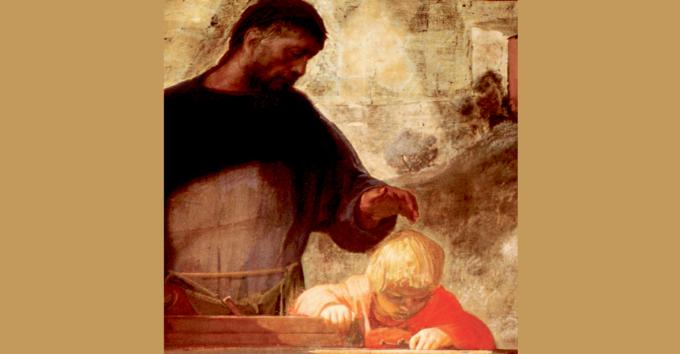
Faith
Much of the modern social teaching of the Church is inextricably intertwined with her teachings on work and labor -- both on the dignity of work and, more importantly, on the dignity of those who work. This past year, however, seems to have made the importance of work more prominent than usual.
Since 1955, the feast of St. Joseph the Worker has been celebrated on May 1. In this Year of St Joseph, this offers another opportunity to honor this oft-neglected saint.
I have to admit that, to me, the moniker "Worker" seems startlingly mundane for such a great saint. St. Joseph, after all, is honored with many loftier titles such as "Light of Patriarchs," "Patron of the Dying," "Protector of the Holy Church," "Patron of the Universal Church," and the particularly vivid "Terror of Demons" -- to name but a few. Within his family, he is both "Spouse of the Mother of God," and "Foster-Father of the Son of God." More sublime or awesome appellations would be hard to imagine.
Yet, it is under the most ordinary title, "Worker," that we celebrate St. Joseph when April turns to May. St. Joseph, indeed, was a worker. By scriptural accounts, he worked as a carpenter by trade. He also did the hard and difficult work of caring for and protecting his family when the circumstances of life demanded it. We do not know much about St. Joseph, but we know that he loved, he trusted, he obeyed, and, indeed, he worked.
This feast day falls in a busy season of the year. It arrives after the excitement of Easter and in the month of many First Communions, Confirmations, spring weddings, college graduations, and the flurry of activities that come as academic years wind down and summer plans are made. Like St. Joseph himself, this holiday can be easily overshadowed.
But, 2021 may be a particularly important year to celebrate the feast of St. Joseph the Worker.
Much of the modern social teaching of the Church is inextricably intertwined with her teachings on work and labor -- both on the dignity of work and, more importantly, on the dignity of those who work. This past year, however, seems to have made the importance of work more prominent than usual.
We may have noticed anew the critical role of "essential" workers in our lives -- workers who often do tasks that are demanding, dangerous, unpleasant, poorly paid, stressful, and so easy to overlook when life is "normal."
We may have noticed anew the pain of unemployment as this burden touched the lives of many who did not expect to feel its sting.
As many have taken on the roles of teachers or caregivers in new ways, we may have noticed anew how important these roles are in the lives of our loved ones, and how easy it is to take those who do this work for granted.
As we and our loved ones spent more time together at home, we may have noticed anew all the work it takes to keep a home healthy, happy, and safe.
As we have feared or worried, we may have noticed anew the everyday strength of first responders who never know what lies ahead of them.
As we return to all the businesses that have been closed for so long, we may have noticed anew how much we miss all those who labor there and the goods and services on which we depend.
As we miss movies, concerts, museums, and theater, we may have noticed anew how much we miss those whose creative work fills our lives with things of beauty.
As we have lost loved ones, we may have noticed anew how many do the difficult work of caring for the dying, comforting the living, and burying the dead.
As we have realized how much we can take our parishes for granted, we may have noticed anew the important work of those who give their lives to the service of God.
In new ways, as some work ended, some work began, and some work changed, we may have noticed anew how important "the worker" is.
Work of all kinds fills so much of our lives. This is true of both the work we do to earn our daily bread, as well as that work that is unpaid and priceless. In the work given to each of us lies a unique way in which we can use the gifts we have been given to play our own role in God's plan for the world. There are times when this creative, sacred nature of work is easy to see. When a task is successfully completed, when an exciting initiative is undertaken, when an unexpected breakthrough comes, or when someone says "thank you" for our labors, it is easy to see the joy in work. At other times, mundane tasks, failed projects, stress and exhaustion can cloud that vision and work seems a heavy burden.
In his own life of work, St. Joseph likely knew all these things. Yet, in his labors he put his gifts and talents at the service of God, contributed to the common good and supported his family.
Perhaps this holiday with the plainest of names is the right way to honor St. Joseph. In honoring him as "The Worker" we have an invitation to reflect on the value of work and the dignity of the work done by us and by others. It may also be an invitation to take to prayer the worries we have about our work -- and to bring to our work the strength that we draw from our prayers. I would like to think that St. Joseph did both very well!
As the lives of workers have changed so much, so fast, and so recently, may God bless those who do the good labor of ordinary time.
Recent articles in the Faith & Family section
-
Wounds, not scarsJaymie Stuart Wolfe
-
A special collection in the liturgy libraryFather Robert M. O'Grady
-
Witness to a Transfiguration in KenyaMichele Miers
-
Understanding the ScripturesScott Hahn
-
'Cabrini' does extraordinary job of bringing saint to lifeBishop Nicholas DiMarzio


















